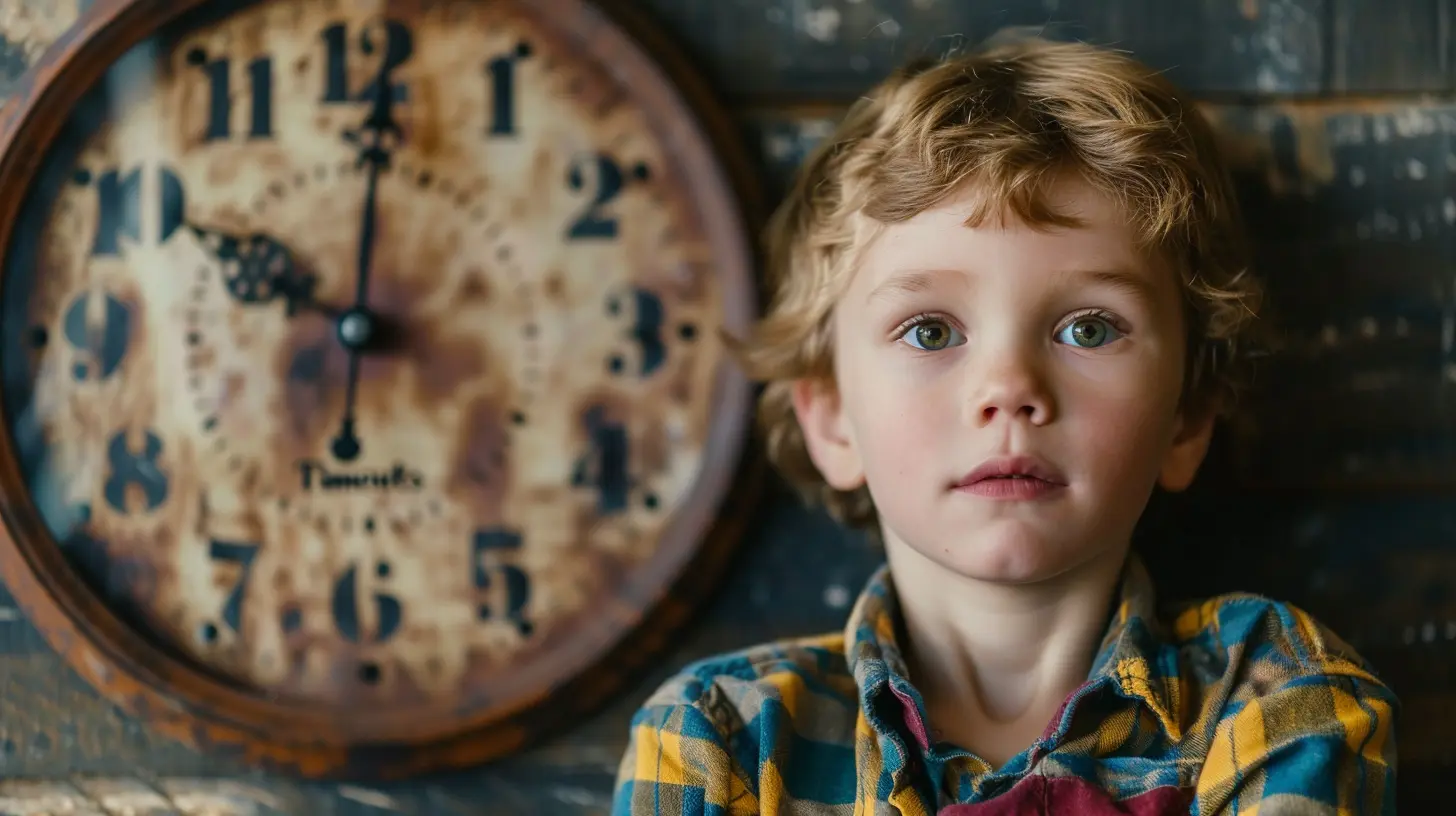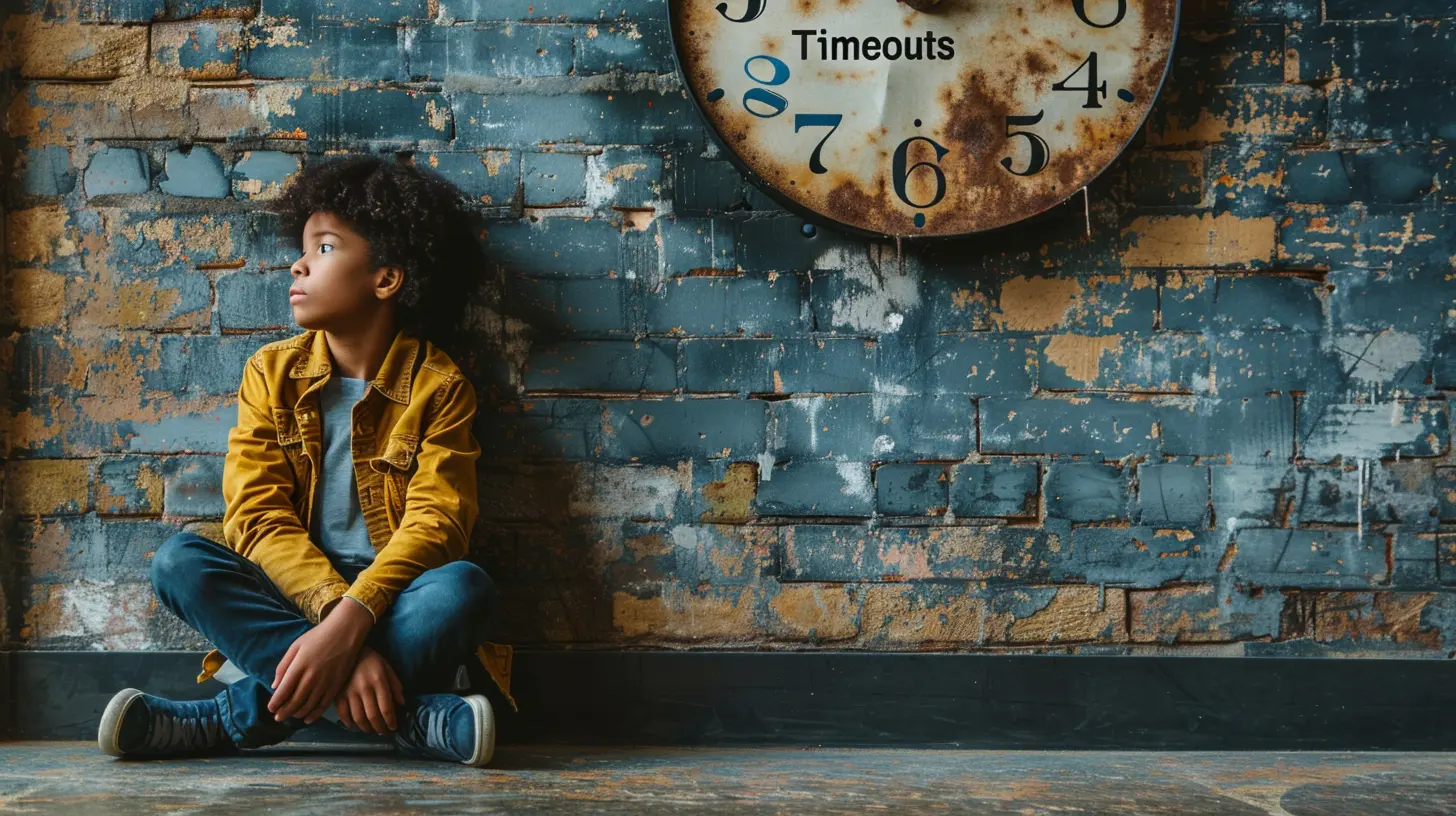Redefining “Timeouts” with Positive Alternatives
28 December 2024
As parents, most of us have been there — moments when our kids push us to the brink of frustration. Maybe your toddler just dumped cereal all over the floor (again), or your teenager gave you some serious attitude. What's a common go-to reaction in these moments? The "Timeout."
The idea behind "Timeouts" is to give children a minute to cool off and reflect on what they did wrong. But are timeouts always effective? More and more, parents and child development experts are questioning whether timeouts actually teach the right lessons. And, if they don't, what are the positive alternatives out there?
Today, let's dive deep into the concept of timeouts — why they might not always work and how we can redefine them by offering positive alternatives that help our kids learn, grow, and thrive.

The Origins of the Timeout
Timeouts have roots in behaviorism, a psychology theory that emphasizes modifying behavior through rewards or consequences. Essentially, a timeout is a form of punishment — when your child misbehaves, you remove them from a situation or take away their stimulus (such as sending them to a quiet corner or their room). In theory, this pause gives them time to reflect on their behavior.For many years, timeouts have been considered a go-to disciplinary tool for parents. On the surface, it makes sense: if your child is acting out, separating them from the situation gives everyone a moment to breathe and gather themselves.
But here's the catch: timeouts may not be accomplishing what we'd hoped.

Why Traditional Timeouts Might Not Work
While many parents believe that timeouts allow kids to "think about what they've done," research shows that may not be the case. Let's consider it from the perspective of a young child:Imagine being sent away to your room after you’ve just spilled some juice or had a tantrum over a toy. What are you thinking? Are you reflecting on your behavior? Probably not. More often than not, kids are left feeling confused, disconnected, or even resentful. They might not understand why they were removed, especially when the behavior in question often stems from impulse control issues or emotional overwhelm — both of which are completely normal aspects of development.
Emotional Disconnection
Timeouts can create a sense of emotional separation between parent and child. Sure, they offer a breather, but can isolation really lead to better behavior? Oftentimes, children (particularly younger ones) can feel abandoned. This doesn't foster a sense of trust or support, which they deeply need in the moment of conflict.Missed Opportunities for Learning
Think about it this way: when kids misbehave, they're displaying a need. They might be frustrated, tired, hungry, or simply overwhelmed by emotions they don't know how to manage yet. A timeout doesn’t address the root cause of the behavior — it just shuts it down temporarily. When we miss these moments to teach emotional regulation and empathy, we miss valuable opportunities for growth.Fostering Shame Instead of Understanding
Instead of feeling regret for their actions, children could internalize the experience as failure. They might think, "I’m bad," rather than understanding, "What I did was not okay." Over time, this can breed feelings of guilt or shame rather than fostering the desired self-awareness.Power Struggles
Let's face it — timeouts can turn into power struggles. Have you ever sent your child to timeout only to have them scream or stubbornly refuse to stay put? This escalates the tension and makes everyone more frustrated. In the end, no one wins.Given all these potential pit-falls, it's clear that traditional timeouts might not always be the most effective choice. The question becomes: what can we do instead?

Positive Alternatives to Timeouts
Don't worry; this doesn’t mean you're doomed to a life of chaos or tantrums without any way to manage them. There are tons of positive alternatives to the timeout that not only encourage better behavior but also help nurture emotional intelligence and communication. Let’s explore some of these alternatives that can positively transform those challenging moments!1. Calm-Down Corners
Rather than isolating your child, a "calm-down corner" (often called a "peace corner") gives them a designated space to regulate their emotions. Fill it with soft things like pillows, stuffed animals, calming books, or sensory toys. The idea here is to create a safe space where children can retreat when emotions get overwhelming without feeling punished.Instead of saying, "Go to timeout," you can try, "I see you're upset. Why don’t you take a minute in your calm-down corner to relax?" This shifts the focus from punishment to self-regulation in a way that’s inviting and nurturing rather than punitive.
2. Time-Ins
Instead of sending your child off to reflect alone, consider the concept of "time-ins." With a time-in, you sit with your child through their difficult emotions. You can comfort them, talk to them, or just hold space for their feelings. This strategy emphasizes connection and helps children feel supported during tough moments.Imagine it this way: rather than isolating your child for having big emotions, you take that opportunity to model emotional regulation. You can say things like, "I see you’re frustrated. Let’s take some deep breaths together." In this way, you’re teaching them that emotions aren’t bad — they just need to be managed.
3. Problem-Solving Together
When kids misbehave, it’s often because they don't have the tools — emotional or otherwise — to express themselves appropriately. Instead of focusing on the misbehavior, focus on the solution.Once everyone has calmed down, sit down and talk it out: "I see you were upset earlier. What can we do differently next time?" or "How can we work together to fix this problem?" This shifts the conversation from blame to collaborative problem-solving, where children learn responsibility and accountability in a positive way.
By involving your child in the process, you are empowering them to take ownership of their actions without emphasizing punishment.
4. Redirection
Sometimes, children act out because they've been overstimulated or are struggling to communicate their needs clearly. In these cases, it can help to offer redirection rather than a timeout.For example, if a toddler is throwing toys, instead of saying, "Stop that and go to timeout," you can redirect by saying, "We don’t throw toys — let’s try building with blocks instead." Redirection helps children channel their energy into more positive activities, allowing them to shift focus without feeling like they’ve done something terribly wrong.
5. Connection Before Correction
This is a big one! Children thrive when they feel connected to their caregivers. Before addressing misbehavior, check in with your child.Ask yourself:
- Are they hungry?
- Are they tired?
- Are they feeling disconnected or lonely?
- Are they overstimulated?
Once you’ve connected and addressed any unmet needs, you’ll find that the misbehavior often evaporates on its own, or at least becomes more manageable.
When we focus on connection first, we create a foundation for cooperation and understanding.
6. Teaching Emotion Regulation
The truth is, young children often act out because they don’t know how to process their emotions. They aren’t born with the skills to manage anger, frustration, or sadness — those are learned over time.Instead of sending your child to timeout, take those moments to teach emotional regulation skills:
- Practice deep breathing.
- Label emotions (e.g., "You seem really angry right now. It’s okay to feel angry.").
- Role-play different scenarios.
- Encourage the use of words to express feelings.
By gradually giving your child these emotional tools, you’ll notice a decrease in the frequency of meltdowns because they’re learning how to handle their big feelings.

Implementing These Alternatives
You might be wondering — are these alternative approaches to timeouts really feasible in the heat of the moment? The short answer is yes, but it takes time and practice.Here’s the thing: parenting isn’t about perfection; it’s about progress. We all lose our cool now and then, and that’s NORMAL. What matters most is being open to trying new strategies and giving both you and your child some grace along the way.
Start small. Maybe the next time your child acts out, you try a calm-down corner instead of sending them away. Experiment with time-ins or redirection and see what resonates best with your family dynamic.
The key is to remember that our goal isn’t to punish our children — it’s to guide them. And every "misbehavior" is a chance to teach them something valuable.
Wrapping it Up
Redefining timeouts doesn’t mean you’re letting your kids get away with bad behavior. On the contrary, positive alternatives empower children to learn patience, empathy, and self-regulation in a way that’s constructive rather than punitive.At the end of the day, parenting is about raising emotionally intelligent, kind, and resilient humans. So, the next time you’re about to call for a timeout, pause and ask yourself: Can I connect with my child in a way that helps them grow?
Because, after all, misbehavior is just an opportunity for deeper connection and growth.
all images in this post were generated using AI tools
Category:
Positive ParentingAuthor:

Liam Huffman
Discussion
rate this article
16 comments
Derek McCray
This article offers refreshing strategies for timeouts that emphasize positivity and connection. Shifting focus from punishment to understanding can truly transform parenting and strengthen bonds with our children.
February 9, 2025 at 4:33 AM

Liam Huffman
Thank you! I'm glad you found the strategies helpful. Emphasizing connection can make a significant difference in parenting.
Calder McCoy
This article offers refreshing alternatives to traditional timeouts, emphasizing the importance of constructive discipline. Positive approaches can foster emotional regulation and strengthen parent-child bonds, turning moments of tension into opportunities for connection and growth. A must-read for modern parenting!
February 4, 2025 at 4:09 AM

Liam Huffman
Thank you for your thoughtful comment! I'm glad you found the article helpful in exploring positive discipline strategies that enhance connections between parents and children.
Jessica Pope
Embrace positive alternatives to timeouts; they foster connection and growth in your child's journey!
January 30, 2025 at 4:07 PM

Liam Huffman
Absolutely! Embracing positive alternatives not only nurtures connection but also promotes emotional growth, creating a supportive environment for our children's development. Thank you for your insights!
Viva Edwards
Empowering approach! Love the positive alternatives shared!
January 26, 2025 at 4:01 PM

Liam Huffman
Thank you! I'm glad you found the alternatives empowering!
Bella Jordan
Love this approach! Timeouts can be reimagined into positive moments for growth!
January 24, 2025 at 3:53 PM

Liam Huffman
Thank you! I’m glad you see the potential in timeouts for fostering growth and positivity!
Zanya Wade
Who knew timeouts could be so trendy? Instead of a 'time-out,' let’s call it a 'mindfulness retreat for mini-mes.' While they’re at it, maybe we can schedule adult retreats too—preferably involving snacks and zero Lego stepping hazards. Who's in for a spa day, parenting edition?
January 21, 2025 at 5:02 PM

Liam Huffman
Absolutely! A mindfulness retreat for kids sounds perfect, and I’m all for adult retreats that include snacks and Lego-free zones. Let’s redefine timeouts together!
Meagan Harper
Embrace positive alternatives to timeouts—transform moments of discipline into opportunities for growth!
January 18, 2025 at 5:17 PM

Liam Huffman
Absolutely! Transforming discipline into growth opportunities fosters a more supportive environment for learning and development. Thank you for your insightful comment!
Milena Franco
In a world where discipline meets empathy, redefining ‘timeouts’ unveils a treasure trove of transformative parenting strategies. What if these moments of pause could unlock deeper connections? Discover the untold secrets that lie within the silence, waiting to reshape your parenting journey.
January 14, 2025 at 5:09 PM

Liam Huffman
Thank you for highlighting the powerful potential of redefining timeouts! Embracing these moments can indeed foster deeper connections and transform our parenting approach.
Korian Roth
Thank you for sharing these thoughtful alternatives to traditional timeouts. Embracing positive strategies can truly foster understanding and connection between parents and children. It’s heartening to see approaches that prioritize empathy and growth in our parenting journeys.
January 10, 2025 at 5:41 PM

Liam Huffman
Thank you for your thoughtful comment! I'm glad you found the alternatives valuable for fostering connection and empathy in parenting.
Poppy Moses
This article offers a refreshing perspective on discipline by redefining timeouts. Emphasizing positive alternatives fosters emotional understanding and connection, transforming a traditional punishment into a learning opportunity. Such approaches encourage healthier communication and promote a nurturing environment for children's growth. A must-read!
January 5, 2025 at 5:41 AM

Liam Huffman
Thank you for your thoughtful comment! I’m glad you found the article insightful and appreciate the emphasis on fostering emotional understanding through positive alternatives.
Karina Roberson
This article offers a refreshing perspective on timeouts, emphasizing positive alternatives that foster emotional growth. I appreciate the focus on constructive methods that nurture, rather than punish. Great insights!
January 1, 2025 at 3:20 AM

Liam Huffman
Thank you for your thoughtful feedback! I'm glad you found the emphasis on constructive methods valuable.
Daisy Brown
This article effectively reimagines traditional timeout strategies by emphasizing positive alternatives. By fostering emotional regulation and reinforcing connection, parents can cultivate a nurturing environment that encourages growth and understanding.
December 31, 2024 at 4:25 PM

Liam Huffman
Thank you for your thoughtful comment! I'm glad you found the article's emphasis on positive alternatives and emotional regulation helpful in fostering a nurturing environment for growth.
Lauren McQuaid
Embracing positive alternatives to traditional timeouts can transform parenting! By fostering connection and understanding, we create a nurturing environment where our children thrive. Let's redefine discipline as an opportunity for growth and strengthen our bonds through love and compassion!
December 31, 2024 at 5:19 AM

Liam Huffman
Thank you for your thoughtful comment! I wholeheartedly agree that fostering connection and understanding is key to transforming discipline into a nurturing experience for our children. Together, we can redefine how we approach parenting!
Soliel McClendon
Timeouts can be reimagined as opportunities for reflection and connection. By incorporating positive alternatives, we foster emotional growth and strengthen our child's understanding of boundaries.
December 30, 2024 at 4:42 PM

Liam Huffman
Thank you for your insightful comment! I completely agree that reimagining timeouts as chances for reflection can enhance emotional growth and help establish healthy boundaries.
Amalia Yates
Great insights! Positive alternatives can truly transform the timeout experience into a learning opportunity.
December 29, 2024 at 4:22 AM

Liam Huffman
Thank you! I'm glad you found the insights valuable. Transforming timeouts into learning experiences can make a significant difference.
Quill Sharp
Redefining 'timeouts' encourages us to shift from punitive measures to moments of reflection. Emphasizing connection over isolation fosters emotional intelligence and resilience, guiding our children to navigate their feelings with understanding and compassion.
December 28, 2024 at 3:33 PM

Liam Huffman
Thank you for your insightful comment! I wholeheartedly agree that focusing on reflection and connection can greatly enhance our children's emotional intelligence and resilience.
MORE POSTS

Listening to Your Instincts: How Attachment Parenting Encourages Parental Intuition

How to Make Family Bonding a Positive Experience

Responsibility and Schoolwork: Tips for Parents

Supporting Your Child’s Learning Journey with Encouragement

Creative Ways to Sneak Vegetables Into Your Child’s Meals

How to Build Family Traditions that Grow as Your Children Age

Safe Sleep Tips for Babies: What Parents Need to Know

Understanding the Basics of Attachment Parenting: A Gentle Approach to Raising Children

Overcoming Common Homeschool Challenges

The Role of STEM in Your Child’s Education